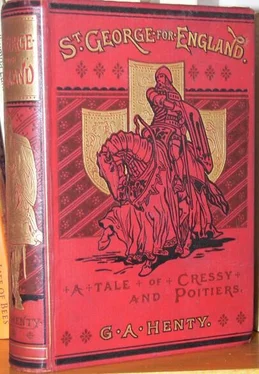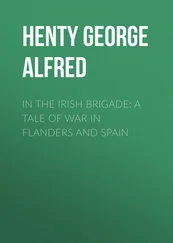G. Henty - St. George for England - A Tale of Cressy and Poitiers
Здесь есть возможность читать онлайн «G. Henty - St. George for England - A Tale of Cressy and Poitiers» весь текст электронной книги совершенно бесплатно (целиком полную версию без сокращений). В некоторых случаях можно слушать аудио, скачать через торрент в формате fb2 и присутствует краткое содержание. Жанр: Старинная литература, на английском языке. Описание произведения, (предисловие) а так же отзывы посетителей доступны на портале библиотеки ЛибКат.
- Название:St. George for England: A Tale of Cressy and Poitiers
- Автор:
- Жанр:
- Год:неизвестен
- ISBN:нет данных
- Рейтинг книги:3 / 5. Голосов: 1
-
Избранное:Добавить в избранное
- Отзывы:
-
Ваша оценка:
- 60
- 1
- 2
- 3
- 4
- 5
St. George for England: A Tale of Cressy and Poitiers: краткое содержание, описание и аннотация
Предлагаем к чтению аннотацию, описание, краткое содержание или предисловие (зависит от того, что написал сам автор книги «St. George for England: A Tale of Cressy and Poitiers»). Если вы не нашли необходимую информацию о книге — напишите в комментариях, мы постараемся отыскать её.
St. George for England: A Tale of Cressy and Poitiers — читать онлайн бесплатно полную книгу (весь текст) целиком
Ниже представлен текст книги, разбитый по страницам. Система сохранения места последней прочитанной страницы, позволяет с удобством читать онлайн бесплатно книгу «St. George for England: A Tale of Cressy and Poitiers», без необходимости каждый раз заново искать на чём Вы остановились. Поставьте закладку, и сможете в любой момент перейти на страницу, на которой закончили чтение.
Интервал:
Закладка:
The two marshals of the English army, the Earls of Warwick and Suffolk, were among the first to return at the call of the trumpet. Hearing that King John had certainly not left the field of battle, though they knew not whether he was dead or taken, the prince at once dispatched the Earl of Warwick and Lord Cobham to find and protect him if still alive. They soon came upon a mass of men-at-arms, seemingly engaged in an angry quarrel. On riding up they found that the object of strife was the King of France, who had been snatched from the hands of Montbec, and was being claimed by a score of men as his prisoner. The Earl of Warwick and Lord Cobham instantly made their way through the mass, and dismounting, saluted the captive monarch with the deepest reverence, and keeping back the multitude led him to the Prince of Wales. The latter bent his knee before the king, and calling for wine, presented the cup with his own hands to the unfortunate monarch.
The battle was over by noon, but it was evening before all the pursuing parties returned, and the result of the victory was then fully known. With less than eight thousand men the English had conquered far more than sixty thousand. On the English side two thousand men-at-arms and fifteen hundred archers had fallen. Upon the French side eleven thousand men-at-arms, besides an immense number of footmen, had been killed. A king, a prince, an archbishop, thirteen counts, sixty-six barons, and more than two thousand knights were prisoners in the hands of the English, with a number of other soldiers, who raised the number of captives to double that of their conquerors. All the baggage of the French army was taken, and as the barons of France had marched to the field feeling certain of victory, and the rich armor of the prisoners became immediately the property of the captors, immense stores of valuable ornaments of all kinds, especially jeweled baldrics, enriched the meanest soldier among the conquerors.
The helmet which the French king had worn, which bore a small coronet of gold beneath the crest, was delivered to the Prince of Wales, who sent it off at once to his father as the best trophy of the battle he could offer him.
Its receipt was the first intimation which Edward III. received of the great victory.
As the prince had no means of providing for the immense number of prisoners, the greater portion were set at liberty upon their taking an oath to present themselves at Bordeaux by the ensuing Christmas in order either to pay the ransom appointed or to again yield themselves as prisoners.
Immediately the battle was over Edward sent for the gallant Sir James Audley, who was brought to him on his litter by his esquires, and the prince, after warmly congratulating him on the honor that he had that day won as the bravest knight in the army, assigned him an annuity of five hundred marks a year.
No sooner was Audley taken to his own tent than he called round him several of his nearest relations and friends, and then and there made over to his four gallant attendants, without power of recall, the gift which the prince had bestowed upon him. The prince was not to be outdone, however, in liberality, and on hearing that Audley had assigned his present to the brave men who had so gallantly supported him in the fight, he presented Sir James with another annuity of six hundred marks a year.
CHAPTER XXI.
THE JACQUERIE.
On the evening after the battle of Poitiers, a splendid entertainment was served in the tent of the Prince of Wales to the King of France and all the principal prisoners. John with his son and six of his highest nobles were seated at a table raised above the rest, and the prince himself waited as page upon the French king. John in vain endeavored to persuade the prince to be seated; the latter refused, saying that it was his pleasure as well as his duty to wait upon one who had shown himself to be the best and bravest knight in the French army. The example of the Black Prince was contagious, and the English vied with each other in generous treatment of their prisoners. All were treated as friends, and that night an immense number of knights and squires were admitted to ransom on such terms as had never before been known. The captors simply required their prisoners to declare in good faith what they could afford to pay without pressing themselves too hard, "for they did not wish," they said, "to ransom knights or squires on terms which would prevent them from maintaining their station in society, from serving their lords, or from riding forth in arms to advance their name and honor."
Upon the following morning solemn thanksgivings were offered up on the field of battle for the glorious victory. Then the English army, striking its tents, marched back toward Bordeaux. They were unmolested upon this march, for although the divisions of the dauphin and the Duke of Orleans had now reunited, and were immensely superior in numbers to the English, encumbered as the latter were, moreover, with prisoners and booty, the tremendous defeat which they had suffered, and still more the capture of the king, paralyzed the French commanders, and the English reached Bordeaux without striking another blow.
Not long after they reached that city the Cardinal of Perigord and another legate presented themselves to arrange peace, and these negotiations went on throughout the winter. The prince had received full powers from his father, and his demands were very moderate; but in spite of this no final peace could be arranged, and the result of the conference was the proclamation of a truce, to last for two years from the following Easter.
During the winter immense numbers of the prisoners who had gone at large upon patrol came in and paid their ransoms, as did the higher nobles who had been taken prisoners, and the whole army was greatly enriched. At the end of April the prince returned to England with King John. The procession through the streets of London was a magnificent one, the citizens vying with each other in decorating their houses in honor of the victor of Poitiers, who, simply dressed, rode on a small black horse by the side of his prisoner, who was splendidly attired, and mounted on a superb white charger. The king received his royal prisoner in state in the great hall of his palace at Westminster, and did all in his power to alleviate the sorrows of his condition. The splendid palace of the Savoy, with gardens extending to the Thames, was appointed for his residence, and every means was taken to soften his captivity.
During the absence of the Black Prince in Guienne the king had been warring in Scotland. Here his success had been small, as the Scotch had retreated before him, wasting the country. David Bruce, the rightful king, was a prisoner in England, and Baliol, a descendant of the rival of Robert Bruce, had been placed upon the throne. As Edward passed through Roxburgh he received from Baliol a formal cession of all his rights and titles to the throne of Scotland, and in return for this purely nominal gift he bestowed an annual income upon Baliol, who lived and died a pensioner of England. After Edward's return to England negotiations were carried on with the Scots, and a treaty was signed by which a truce for ten years was established between the two countries, and the liberation of Bruce was granted on a ransom of one hundred thousand marks.
The disorganization into which France had been thrown by the capture of its king increased rather than diminished. Among all classes men strove in the absence of a repressive power to gain advantages and privileges. Serious riots occurred in many parts, and the demagogues of Paris, headed by Stephen Marcel, and Robert le Coq, Bishop of Leon, set at defiance the dauphin and the ministers and lieutenant of the king. Massacre and violence stained the streets of Paris with blood. General law, public order, and private security were all lost. Great bodies of brigands devastated the country, and the whole of France was thrown into confusion. So terrible was the disorder that the inhabitants of every village were obliged to fortify the ends of their streets and keep watch and ward as in the cities. The proprietors of land on the banks of rivers spent the nights in boats moored in the middle of the stream, and in every house and castle throughout the land men remained armed as if against instant attack.
Читать дальшеИнтервал:
Закладка:
Похожие книги на «St. George for England: A Tale of Cressy and Poitiers»
Представляем Вашему вниманию похожие книги на «St. George for England: A Tale of Cressy and Poitiers» списком для выбора. Мы отобрали схожую по названию и смыслу литературу в надежде предоставить читателям больше вариантов отыскать новые, интересные, ещё непрочитанные произведения.
Обсуждение, отзывы о книге «St. George for England: A Tale of Cressy and Poitiers» и просто собственные мнения читателей. Оставьте ваши комментарии, напишите, что Вы думаете о произведении, его смысле или главных героях. Укажите что конкретно понравилось, а что нет, и почему Вы так считаете.












